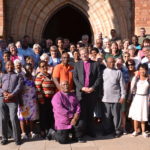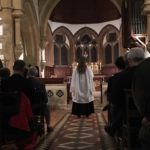A few weeks ago I invited the Diocese of Oxford to dwell deeply in the Beatitudes in Matthew 5 in the coming year in many different ways. As part of this dwelling deep we are holding a series of Area Days in different parts of the Diocese. Around 240 people gathered on Saturday for the Dorchester Area Day at Marlborough School in Woodstock. There were inputs from Bishop Colin on what is happening now across the Dorchester Area and from Maggie Scott, Deputy Chief Executive of Oxfordshire County Council, on the changing face of Oxfordshire. We prayed together and worked around tables on a vision for the future. There was a real sense of energy and purpose in the gathering. This is the text of my opening address which I hope will be helpful for all those exploring the beatitudes this year.
Watch Bishop Steven’s Address or listen below
Thank you very much for gathering here today for the first of four Area Days across the Diocese of Oxford.
Exactly a year ago today I was installed as the 43rd Bishop of Oxford in Christ Church. Many of you were there. Thank you for your prayers and encouragement and support across the year.
I set out on a journey to discover the Diocese focussed around 29 deanery days. Thank you for all your hospitality and time on those days. We began in Abingdon in December and finished in Henley in July.
I met with clergy and ministers over lunch; visited community projects and schools in the afternoon; had dinner with a group of ten or so lay people and then had an open meeting. More than 3,000 people came to those meetings.
I ate a lot of cake. When people ask what did you gain, I sometimes say about half a stone. The Chipping Norton Deanery was the Deanery with the best cake. Chipping Norton and Henley built the most exercise into the day. I was chased by a large black pig called Nuke in rural Buckinghamshire. I went to factories and farms and community ventures aplenty. And I did my best to listen.
Together we are the Church in the Diocese of Oxford across Oxfordshire, Berkshire, Buckinghamshire and Milton Keynes.
Together we are living network of more than a thousand congregations and chaplaincies and schools. Together we work with God’s mission in every city, town, and village across the world.
Together we have many strengths. great people; our Area system; significant resources; our schools; excellence and expertise in many different places
Together we face many challenges. We are sometimes anxious and inward looking. We are overbusy. We are not always good at teaching the faith to enquirers. We are older and less diverse than our population. We are sometimes fragmented. Our resources are not always aligned with our goals.
But together we have many opportunities: we are a diocese of immense influence and potential at a crossroads of the world.
Together we are called to dream dreams and see visions of what could be.
And that is what this next year is about. We have worked for some years with Living Faith. That has borne immense fruit – especially in reshaping the life of the Diocese around God’s mission. But this is a moment when we need to stop and think and listen and pray again and discern together God’s vision and direction for us as the Church in this Diocese.
We are asking two questions: What kind of Church are we called to be?
We are also beginning to ask: What should we, therefore, do together?
We have asked the whole Diocese to work on this first question to think and pray and reflect for a year. That is the main focus of this day.
We have asked six working groups to listen to that reflection and then to think and plan around six themes:
- To make a bigger difference in the world
- To make disciples and grow the local church
- To plant new churches and congregations
- To serve every school in our community
- To put the discipleship of all at the heart of our common life
- To celebrate and bless our largest, fastest growing city: Milton Keynes
But we can only move forward together if we have a common understanding of what kind of Church God is calling us to be in this generation and in this place.
Which is why the first of our questions is by far the most important. What kind of Church are we called to be?
I have observed processes of change in the Church over many years. I have learned some lessons from that journey. The first and the most important is that real change and renewal always begins as we catch together a fresh vision of Jesus Christ at the centre of who we are and who we are called to be.
Telling each other the story of our decline does not generate life and hope and change. Setting each other unrealistic targets and demanding more with less resources does not generate life and hope and change. Calling the Church back to Jesus Christ is the only way forward. Seeing Christ anew, returning to our source and our centre, learning to speak of the Church again, the Body of Christ, with hope and joy and love – these things give life and energy and enable change to happen well. So that is what we are going to do.
What kind of Church are we called to be? A Christ-like Church. A church which is more like Jesus. I have a very simple ambition for the Church in this Diocese. It is that we become more Christian; that we set Christ at the centre; that we try and be like him; that we see Christ formed in us again as individuals and as communities.
How do we become more Christ-like? By spending time with the risen Christ in scripture and sacrament; in prayer and fellowship; in mission and in service.
I am asking the whole Diocese in this coming year to dwell in one particular bible passage: the Beatitudes in the Gospel of Matthew. The most famous and beautiful beginning to the greatest sermon in the entire history of the world: the sermon on the mount.
The beatitudes are almost the first substantial words of Jesus in the Gospel of Matthew. Jesus has been baptised by John. He has been tempted by the devil. He has begun his ministry in Galilee. He has called Simon and Andrew and James and John with the simple invitation “Follow me”. He has travelled and taught and healed the sick.
Now he draws apart up the mountain and his disciples come to him. These are words for the Church but they are also immense good news for the whole world. Jesus speaks to this embryonic church, the people who will be his body, his bride, his own people. Jesus speaks to us in words of joy. Every beatitude begins with “Blessed” – happy, fulfilled, at peace. Jesus speaks to us first in words of hope. Every beatitude has a rich promise. Each begins in blessing and ends in even more. Jesus speaks to us in words of abundance and not scarcity.
Jesus speaks to us about himself. He describes in these beautiful, well-crafted promises his own qualities, his own character. One of the best ways to read the beatitudes is as a kind of self-portrait of Christ. This is the Jesus Matthew, Mark, Luke and John will reveal to us through the gospel.
When Jesus says Blessed are the poor in spirit, we remember his prayer on the mountaintop and in the Garden of Gethsemane. When Jesus says Blessed are those who mourn we remember the way he is deeply moved by the sick, the bereaved and his tears before Jerusalem. Blessed are the meek reminds us of the foot washing, his call to be a servant and his riding into Jerusalem on a donkey. To be hungry and thirsty for righteousness reminds us of his care for the poor and those who have nothing and his rebuke to religious leaders.
Jesus words on mercy call to mind his gentleness with widows and with children and with tax collectors and sinners and prostitutes. His words on peacemaking remind us of his death on the cross and his bringing reconciliation to the whole world, his casting out of demons. His call to be pure in heart reminds us of his own authentic life, his call for inner purity, for secret disciplines. Blessed are the persecuted takes us to the passion and his own example of bearing pain and hardship for the sake of the kingdom of God.
Jesus speaks to us about what it means to be human. Jesus comes to show us what God is like. But he comes also to show us what it means to live abundant life. The most abundant and rich and fulfilling life is not the life of the rich and famous, the lives which fill Hello magazine, the lives young people grow up longing for. The most abundant and rich and fulfilling life is indeed to know that you are poor in spirit and incomplete without God; that you have a heart of compassion to weep for the suffering in the world rather than building walls to shut it out. To live well is not to think you are the best, to get to the top of the pile but to see your place in the world with humility and meekness and therefore joy. You were not made to be blind to what is wrong or to turn away but to fight it.
You were not made to be perfect but to be merciful: to forgive your own failings and imperfections and those of other people. You are not called to be a victim of fear and anxiety and guilt. You are called to keep your heart pure through the whole of your life and to see it restored in God’s image and take flight. You were not made to spend your life angry and bitter and disappointed and at war with the world but you were made for peace and harmony with creation and with all people. You are not designed to bend to every pressure, as simply as a consumer. You were made to make your mark on the world: to be resilient and strong and bear the cost of your convictions.
Jesus speaks to us in the beatitudes about what it means to be the Church. This is you plural not you singular. This is how we are to be together. These beatitudes describe what kind of Church we are called to be.
Eight qualities is a lot to ponder and remember. I can hold them in my mind but I’ve had lots of practice. For that reason, I want to focus the reflection and vision of the Diocese around three qualities which sum up what it means to be a Christ-like Church and sum up what it means to be the Church of the Beatitudes.
We are seeking to be a Church which is more contemplative, more compassionate and more courageous as we live out these words together.
To be contemplative means to spend time with. We are called to be a Church which spends time with God, whose life flows from God’s life, from worship and prayer and stillness and reflection and loving God with all our heart and soul and mind and strength. To be contemplative means to see the glory of God reflected in creation and to learn to live gently on the earth.
To be contemplative is to be poor in spirit, to be meek, to be pure in heart in order to see God.
The Church of England needs to learn to do God really well again. We are in much of our life an anxious church in an anxious world. An anxious church finds compassion very difficult. We are worried about preserving our own life. An anxious church finds courage very hard. We want to stay with the familiar pathways. An anxious church is easily distracted from what is really important, like the Martha of Luke’s gospel. An anxious church is likely to be far too busy to be good news to the world. The antidote to anxiety is dwelling deep in God: in contemplation, stillness, reflection, a well-ordered life.
The many different communities we serve need a contemplative church. The people around us who are like sheep without a shepherd need a church which is willing to take God seriously. We are really no earthly use without a heavenly dimension. We are a poor social club. We are not the society for the preservation of ancient buildings. Without contemplation, we can easily become an empty group of do-gooders concerned more for our own survival than for the salvation of the world.
To be compassionate means to suffer or feel with. We are called as a Church to grow communities of kindness and gentleness. In the words of Isaac Pennington, the early Quaker:
“Our life is love and peace and tenderness and bearing with one another and forgiving one another and not laying accusations one against another, but praying for one another and helping one another up with a tender hand”.
2.35 million people live across the Diocese of Oxford in cities and towns and villages. In every place God has called an often fragile community of people to bear witness to what it means to live abundantly: to be leaders in compassion; to love our neighbours as ourselves and to help make the world a better place. That is our calling. We are called to mourn: to take the suffering of the world seriously. We are called to be merciful.
Finally to be courageous means to live with all our hearts – as individuals and as a Church. It means to rediscover our passion and energy and conviction, to really go for it as the Church in this place in this generation, to play the game for all its worth, to leave everything out on the field.
Our world needs a church which is courageous in our work for justice; a church which is courageous in our work for peace; a church which is courageous in living against the grain of our culture and bearing the cost of that, whatever it may be.
Our world needs us to be and we so often are, thank God, a Church which walks towards the pain and difficulty and grief and sorrow in the world and embraces the difficult questions and the work which no-one else will do. We need the courage to dream big dreams together and to cast big visions – visions which will call out the best gifts of our people and make an immense difference to the life of the world.
Courage comes from a restored heart. Compassion comes from a restored heart. The heart is restored and renewed through contemplation: through resting in Christ, the true vine, so that together we might bear much fruit.
It’s very good to have so many people here from so many different churches. 250 among the many thousands who worship and serve regularly in our churches. Please would you be the yeast across the dough of the Dorchester Area. Encourage your PCCs and your home groups and your ministry teams and congregations and schools to join in this great work of listening to God this year, of dwelling deep in the beatitudes, of catching a vision of what it means to be more contemplative, more compassionate and more courageous as a Church and to be part of God’s great work of renewal.



